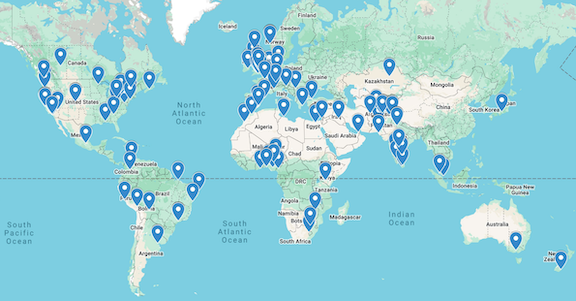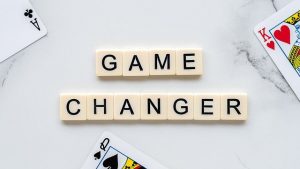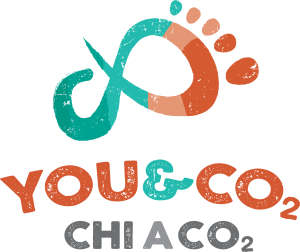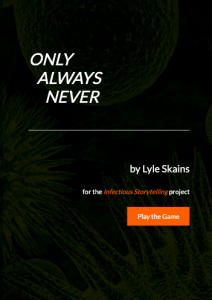The 2023-24 New Media Writing Prize, directed by BU’s Lyle Skains and judged by BU practitioners and researchers Dalia Elsheikh, Jim Pope, and Brad Gyori has drawn to a close after a bright and exciting two days of creative “Unconferencing”, a brilliant and thought-provoking keynote on generative AI and electronic literature from Professor Anastasia Salter, and the announcement of all winners for this year’s prizes. The keynote and awards ceremony are available on YouTube for anyone who missed them.
This year the events were moved to May from January to fit better with semester timetables and activities around the Bournemouth Writing Prize. This move proved fortunate as we saw our entries nearly double this year over previous years, with 194 eligible works submitted from 45 different countries. Our judges certainly needed the extra time to review and debate the wealth of high quality submissions of interactive digital narrative and journalism.
The Awards
All works are accessible on the 2023 NMWP website.
Chris Meade Memorial Main Prize
Our judges shortlisted eight works for the main prize; Florence Walker’s I Dreamt of Something Lost topped the category:
- WINNER – I Dreamt of Something Lost by Florence Walker
- A Condensed History of Australian Camels by David Thomas Henry Wright, Louis Pratt, Karen Lowry, Chris Arnold
- Congee by Rebecca Chui
- Infinite Eddies by Siobhan O’Flynn
- L and the Empress of Sand by Jon Stone
- Musselled Out by Dolly Church, Elinor Kirchwey, Eamon Foreman, Niall Tessier-Lavigne
- The Hotline by Kasey Gambling
- Voices by Christine Wilks
Writers Online Student Prize
- WINNER – Polterkicks by Emma Husa
- An Undecided Fate by Drew Ott
- I Dreamt of Something Lost by Florence Walker
- Meow Memoir by Brynna Hosszu
- What Remains? by Vegard Fotland
- Words So Much Like Ivy by Chris Pang
Social Good Prize
2023-24 marks the very first year this prize has been awarded; it is supported entirely by the associated NMWP Unconference. The focus on interactive digital narrative for the purposes of social good or addressing global challenges (such as the UN Sustainable Development Goals) is drawn from Lyle Skains’ research into the creation and efficacy of interactive narrative to inspire attitude and behaviour change on topics of socio-cultural, medical, and ecological importance.
- WINNER – Musselled Out by Dolly Church, Elinor Kirchwey, Eamon Foreman, Niall Tessier-Lavigne
- A Condensed History of Australian Camels by David Thomas Henry Wright, Louis Pratt, Karen Lowry, Chris Arnold
- The Hotline by Kasey Gambling
- Tree-Person by Talita Bedinelli
- Voices by Christine Wilks
Opening Up Prize
- WINNER – all the borders I crossed without you by Rosalind Fielding
- Crowbar by Dylan Spicer
- Infinite Eddies by Siobhan O’Flynn
- Memory Eternal (Вічная Пам’ять) (2023) by the Decameron Collective
- The Hotline by Kasey Gambling
- Voices by Christine Wilks
FIPP Media Journalism Prize
- WINNER – SOS – SAVE OUR SOILS by Marius Münstermann
- Choking Kurdistan by Tom Brown
- Terraforming Singapore: Is the future made of sand? by Zafirah Zein
- The illusion of prosperity by Katerina Afanasyeva
Unconference Report
Anastasia Salter’s keynote (viewable on YouTube) capped off the Unconference and transitioned us to the awards ceremony. Their insights on generative AI and how it is already influencing electronic literature (another wave of software reproducing social bias and inequality) even while offering the next step in the evolution of creative tools were both concerning and exhilarating—perhaps a perfect note to strike in an Unconference themed around inclusivity.
Our second annual Unconference unfolded over two days leading up to the NMWP Award Ceremony. 40 creatives, academics, and students attended from across the world, including the UK, USA, Canada, India, Norway, and Mexico.
As a more creatively-focused event, the Unconference focuses on workshops and performances, with relevant academic talks dispersed throughout. We learned fundamentals of programming, how to create a GitHub website, and considerations for creating interactive digital narratives with purpose (such as wellbeing).
We were also treated to electronic poetry, a preview of the very first Indian anthology of electronic literature, Instagram storytelling, and discussions of art and health.
We played together in netprov (improvisational, collaborative online storytelling), spitballed approaches to teaching electronic literature and making it more accessible, and became Wikipedia editors as we seek to grow elit’s representation on this foundational site of knowledge.


 I joined colleagues in FMC in launching the Science, Health, and Data Communications Research Group, a growing centre of cross-faculty BU researchers creating and researching public communications and education on pivotal topics such as climate change, dementia, mental health, COVID, sustainability, ecology, and more. We are hosting our
I joined colleagues in FMC in launching the Science, Health, and Data Communications Research Group, a growing centre of cross-faculty BU researchers creating and researching public communications and education on pivotal topics such as climate change, dementia, mental health, COVID, sustainability, ecology, and more. We are hosting our 
 I invite you to join us in developing our proposal for Sustainable Storytelling for Science & Health as a
I invite you to join us in developing our proposal for Sustainable Storytelling for Science & Health as a 













 Beyond Academia: Exploring Career Options for Early Career Researchers – Online Workshop
Beyond Academia: Exploring Career Options for Early Career Researchers – Online Workshop UKCGE Recognised Research Supervision Programme: Deadline Approaching
UKCGE Recognised Research Supervision Programme: Deadline Approaching SPROUT: From Sustainable Research to Sustainable Research Lives
SPROUT: From Sustainable Research to Sustainable Research Lives BRIAN upgrade and new look
BRIAN upgrade and new look Seeing the fruits of your labour in Bangladesh
Seeing the fruits of your labour in Bangladesh ECR Funding Open Call: Research Culture & Community Grant – Apply now
ECR Funding Open Call: Research Culture & Community Grant – Apply now ECR Funding Open Call: Research Culture & Community Grant – Application Deadline Friday 12 December
ECR Funding Open Call: Research Culture & Community Grant – Application Deadline Friday 12 December MSCA Postdoctoral Fellowships 2025 Call
MSCA Postdoctoral Fellowships 2025 Call ERC Advanced Grant 2025 Webinar
ERC Advanced Grant 2025 Webinar Update on UKRO services
Update on UKRO services European research project exploring use of ‘virtual twins’ to better manage metabolic associated fatty liver disease
European research project exploring use of ‘virtual twins’ to better manage metabolic associated fatty liver disease